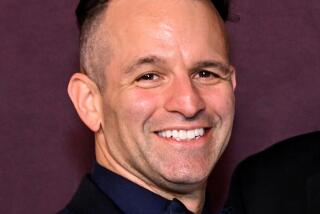Buying Harvey Weinstein’s former studio may be the easy part for Contreras-Sweet. Now what?

Maria Contreras-Sweet stunned Hollywood when she and her billionaire backer Ron Burkle pulled off an eleventh-hour bid to buy assets from the teetering Weinstein Co. after months of on-again off-again negotiations, saving the studio from almost certain bankruptcy.
But the former Obama administration official’s next act may prove even harder.
Now begins the work of delivering on her investor group’s promise to turn the rubble of Harvey Weinstein’s former New York-based studio into a new, female-focused film and TV company run by women. If the plan works, it would be an unprecedented turnaround for a badly tarnished company and possibly even set an example for the male-dominated entertainment industry.
The investor group has touted its plans to create a compensation fund worth tens of millions of dollars for women who accused Weinstein of sexual harassment and assault. It also says it will save jobs by rehiring much of the existing Weinstein Co. staff in Los Angeles and New York.
“The cornerstone of our plan has been to launch a new company that represents the best practices in corporate governance and transparency,” Contreras-Sweet said in a statement Thursday. “This next step represents the best possible pathway to support victims and protect employees.”
Just how that will be accomplished is unclear. Contreras-Sweet declined to be interviewed Friday.
Questions remain about what the new company will look like after the buyers complete their $500-million deal, $225 million of which will be used to pay off Weinstein Co. debt, sources said.
The buyers have not said what they will name the new studio or who will run it, a pressing issue given the board’s recent firing of David Glasser, the former chief operating officer who was positioning himself to run the newly configured company. Nor have they revealed details on what types of films they will support. The deal is subject to a 40-day closing period.
“I like that there’s a victims fund, and I’m glad most of those people will have work,” said Joe Pichirallo, a former independent film studio executive who teaches at NYU’s Tisch School of the Arts. “Ultimately, though, they’ve got to get down to the nitty-gritty of making and acquiring movies.”
The biggest factor in the future success or failure of the studio is who will take the reins.
Contreras-Sweet, who will be executive chairwoman of the new company, is a respected player in politics and the private sector, but has no experience in the entertainment industry. She previously ran the U.S. Small Business Administration under President Obama from 2014-17, overseeing a $120-billion loan portfolio.
Her private-sector experience includes founding ProAmerica Bank, which focused on supporting Latino-owned businesses. The firm struggled because it had the bad luck of launching in 2006, right before the financial crash. Her business career began with a long stint at 7-Up/RC Bottling Co., where she became an equity partner when Westinghouse sold the company.
“She’s been effective at any job she’s had, so I don’t think there’s anyone better to take Weinstein Co. and turn those assets into the model for how companies should treat their employees,” said Ruben Gonzalez, senior advisor for strategic affairs at the L.A. Area Chamber of Commerce, who has known Contreras-Sweet for years.
Burkle, for his part, has dabbled in Hollywood, but only as a financial partner, not someone who picks and makes movies. He invested in Relativity Media, which fell into bankruptcy in 2015. He also invested in some Weinstein Co. movies and backed a failed bid for Harvey Weinstein and his brother, Bob, to buy back their former studio, Miramax, from Walt Disney Co.
A spokesman for Burkle, who would own about 20% of the new company, did not respond to requests for an interview.
Running a studio requires relationships with directors, producers and actors, and most of the people who had those connections at Weinstein Co. are now gone.
Weinstein, who co-founded the company in 2005 and built it into an indie powerhouse with such acclaimed movies as “The King’s Speech” and “Django Unchained,” was fired Oct. 8 after sexual abuse allegations against him sent the company into a tailspin. The board fired Glasser last month after New York Atty. Gen. Eric Schneiderman accused him of not doing enough to protect women from Weinstein. Glasser said the board had scapegoated him. Bob Weinstein is expected to leave the company with a handful of assets to start a new business.
“Ron and Maria have been at it since November. They know this company,” said Weinstein Co. board member Tarak Ben Ammar. “So it’s not as if they’re going to be newcomers.”
To survive, the new studio will need to quickly find a female executive — like “The Post” producer and former Sony Pictures studio chief Amy Pascal — with a robust track record in Hollywood, Los Angeles investment banker Lloyd Greif said.
“It’s not just about having a female board, it’s about installing a female CEO and actively reaching out to female producers,” Greif said. “That talent exists. The opportunity is there, and they can really turn it around. Otherwise, it’s still the Weinstein Co. with another name.”
Ben Ammar would not say whom the buyers were considering.
“I know they have some great ideas,” he said. “What matters is that there will be top managers that will succeed.”
Starting an indie film company can be a Sisyphean endeavor even without the baggage of being associated with Weinstein Co. The box-office market for smaller films for adult audiences — previously the Weinsteins’ bread and butter — has become increasingly perilous as audiences flock to either mega-budget blockbusters or micro-budget horror movies.
Some specialty distributors, such as stalwarts Fox Searchlight and Focus Features and newcomer A24, are finding success with modestly budgeted, high-quality films, especially those that score Oscar nominations. But others, such as Relativity Media and Broad Green Pictures, have charged into the business with big ambitions and lots of cash, only to retreat.
Another question is whether the new studio will have the funding to succeed where others have failed. The buyers are expected to invest $275 million to launch the new company. And unlike other new studios, the company has the advantage of Weinstein Co.’s 277-film library, which generates cash flow from home video, streaming and TV deals.
Then there’s the issue of what happens to Weinstein Co.’s slate of unreleased projects. People close to the sale said the company plans to raise as much as $50 million for a victims’ fund by selling unreleased movies. That would be part of a $90 million compensation package that includes insurance policies and a $10 million line of credit. Bob Weinstein will receive $10 million in escrow as payback for funds he put up to finance development of a movie, sources said. The brothers — who own about 40% of the business — will lose their stakes.
While satisfying Schneiderman’s demands, however, selling off projects to compensate Weinstein’s accusers would also leave the company with a slimmer film slate.
Even the availability of significant funding won’t guarantee success, said NYU’s Pichirallo.
“You’ve seen companies come in with a lot of money, make bad decisions and go away,” Pichirallo said. “It’s really going to be about who picks the movies.”
More to Read
Inside the business of entertainment
The Wide Shot brings you news, analysis and insights on everything from streaming wars to production — and what it all means for the future.
You may occasionally receive promotional content from the Los Angeles Times.







